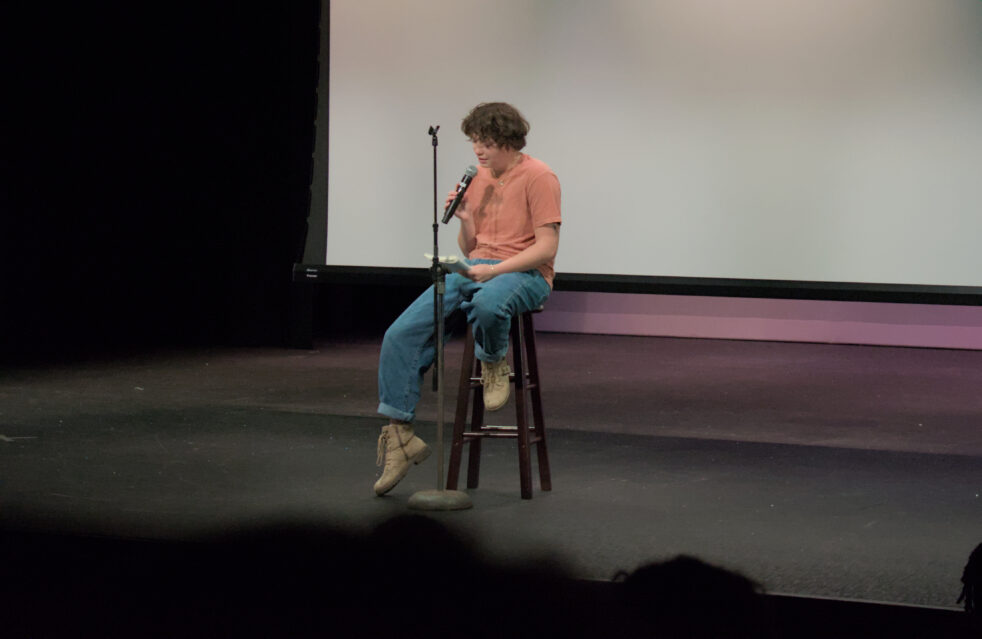Jackets gathered on Wednesday, Sept. 13, to share poetry and spoken word performances about their life experiences. The Poetry Open Mic Night was the first hosted by the Georgia Tech Organization for Social Activism (OSA).
Hosted in partnership with If You’re Reading This GT, the event provided speakers and viewers with a safe space to be vulnerable and connect with their feelings.
In the Student Center’s dimly lit Atlantic Theatre, students spoke freely about the difficult social standards and emotional burdens many have faced.
Under the stage spotlight, students shared emotions of losing loved ones, hard breakups, being defiant, fitting into social life and just making it through the week as an engineering student.
Samantha Bolton, second-year ME and the President and founder of OSA, said, “everyone has that note they wrote in their notes app. This is the place to share it.”
Many students came with prepared pieces, but some performers were moved to speak after other performances.
One student, Semaj Johnson II, first-year BA, spoke about the loss of his brother and the impact that had on his life. “I didn’t plan on sharing, but I am glad I did,” Johnson said.
Poetry Night also served as a fundraiser for the National Alliance on Mental Illness (NAMI), Georgia, with donations collected at the door and through Venmo for NAMI’s efforts.
Bolton spoke to the Technique about the importance of hosting the Poetry Open Mic Night.
“Giving people a space to share the things they have been through that are harder to talk about is so important,” Bolton said. “Life can be very hard, and a lot of people get through their hardships through writing, through art, and so giving a space where people can actually share for once, I think, is very important,” Bolton said.
During the open mic night, Bolton opened with a piece titled “Where the Pretty Flowers Grow.”
“It was a commentary on how a lot of times, especially as women, but even in general, it is almost stigmatized and just kind of looked down upon to talk about ugly things,” Bolton said.
In theme with the goal of the open mic night, “Where the Pretty Flowers Grow” is about how “there should be more spaces and more tolerance for conversations about the bad along with the good,” said Bolton.
She continued, “everyone wants to say this is going well, but I think we should be more willing to talk about what’s going wrong.” Her recitation was met with intense snapping — a poetry night’s show of approval.
After 20 different speakers performing everything from raps to legendary stories, Bolton concluded the event by saying, “if we can all just take a moment to talk to each other, the world would be a better place.”
When asked why poetry and other art forms are important to have access to on campus, Bolton said, “there isn’t enough art space … I was like, wow, we really don’t appreciate the arts.”
Bolton said, “Georgia Tech itself is so separate from the arts because they’re so engrossed in STEM and so engrossed in this idea of success.”
Bolton added that students often “forget to recognize that if we’re struggling, other people are struggling too … we don’t know how to talk about it.”
Bolton also spoke about the work that OSA is doing for inclusivity and acceptance on campus, stating that “justice is an understanding of our differences to support our equality. The divisions within our society don’t reflect the fact that we are all human.”
With OSA, Bolton says she wants to “redefine social justice [as] something more about compassion for humanity. We can all protest and stuff, but at some point, we have to understand that it all comes from a base level of what we are protesting for its human rights, and, you know, understanding that we all deserve to be treated as human.”
Bolton says that OSA and their partners plan on hosting an open mic poetry night monthly to promote inclusion and artistic expression on campus.
She hopes that future events can have themes that promote the same background of vulnerability and inclusion as this event. More information about OSA and future open mic nights can be found on their Instagram @osa_gt.
When asked how poetry can convey meaning across divides, Bolton said, “art is the expression of the human experience. It helps us build equality by understanding that we are all the same.”
Although this was its first run-through, OSA’s Poetry Open Mic Night gave students an effective outlet to express their joy, sadness and other emotions in a safe space on campus, continuing the organization’s legacy of community and social empowerment.
